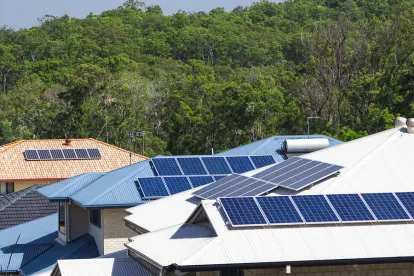On Monday, Massachusetts Governor Charlie Baker signed a solar energy bill into law that increases the statewide limits on the amount of solar capacity that will qualify for net metering, but also lowers the value of net metering credits for large-scale projects. The bill, which was recommended last week by a joint legislative committee formed to reconcile differences between the separate House and Senate proposals, is the culmination of five months of negotiations between the chambers. The controversial bill passed the House and Senate last week by large majorities. For more on this legislation and what it means for solar energy development in Massachusetts, read on!
The legislation increases the net metering cap for private customers from 4% to 7% of the electric distribution company’s (EDC) peak load and for government customers from 5% to 8%. This is an important development for the Massachusetts solar community as existing limits on net metering were reached in some parts of the state last year, stalling new solar project development. The law is likely to allow new projects to go forward until the end of 2016, when some of the limits are expected to be reached again.
The bill also incorporates a number of changes to the state’s net metering compensation, beginning with the creation of a newly defined term, “market net metering credits.” These credits are equal to 60% of the full retail rate and will have the following effects on solar projects:
-
All existing solar projects with net metering approvals (up to 1600 MW) will maintain their current level of net metering compensation for 25 years.
-
All new projects under 25 kW as well as all new “public” projects will continue to receive “full retail value” for their net metering credits.
-
All new private projects that are larger than 25 MW will receive “market net metering credits” for any “excess production” (that is, power not used on site) at 60% of value of the “full retail” rate. (Projects will be “new” and therefore only eligible for “market net metering credits” once the Department of Energy Resources has determined that 1600 MW of solar net metering capacity has been installed in Massachusetts.)
The bill has far-reaching implications beyond the net metering cap and compensation rates.
-
The legislation provides assurance that all projects that have previously qualified for net metering credits and SREC eligibility will maintain the value originally granted to them.
-
It directs the DOER to develop a new solar incentive program to replace the existing SREC II program. The new program is supposed to promote an orderly transition to a “stable and self-sustaining” solar market at a “reasonable cost” to ratepayers.
-
Distribution companies are now permitted to submit, and regulators may approve, proposals for a “monthly minimum reliability contribution” by all solar net metering customers, whether actual or virtual, that equitably distributes the fixed cost of the distribution system that are “not caused by volumetric consumption.”




 />i
/>i

